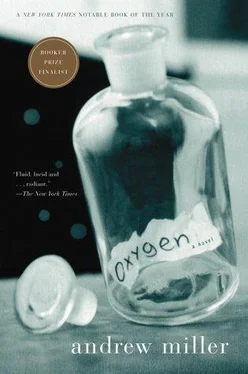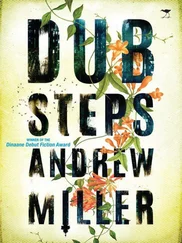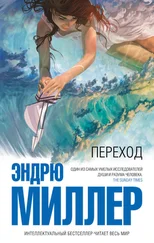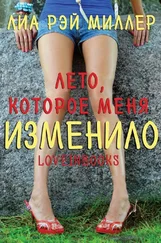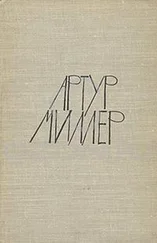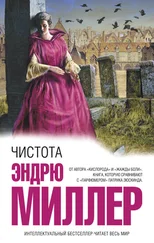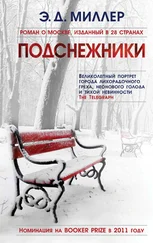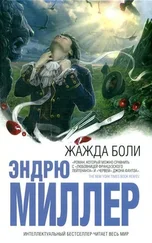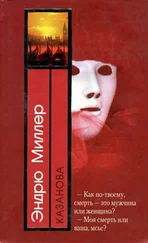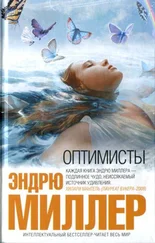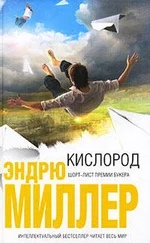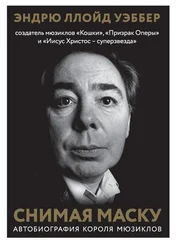The summer ended, the doctors came, the first frosts. Suez. The day he passed over she was in the parlour with Samuel and heard from the bedroom overhead a noise like something dropped, an ornament, a small vase or something, and then her mother calling, ‘Desmond! Desmond! Desmond!’
After dark, Miss Bernard came to lay him out. BerNARD, dear, not BERnad. Put her umbrella in the elephant’s foot by the door. Shook hands like a man. Got Daddy’s parting wrong. The old people were afraid of her because she seemed to know where she would be needed next. To have an instinct for it. Samuel paid her – a guinea? – and all night they sat up listening to the water spill off the gutters because no one had cleared out the dead leaves. What a muddle it was! The hissing of the rain. Her father in his astonishing stillness. Samuel’s breath like feathers on her cheek.
Ting!
The mahogany balloon clock in the living room chimed the half-hour; always five minutes fast, just as the grandmother clock in the hall was five minutes slow and would strike with a soft double note, and the little silver moon with the dreamy face that Stephen had worked on for days would slide a quarter-inch higher on its rail. Tick tock tick tock tick tock. Like drops of water through the sieve of her bones.
It was lunch-time in America. Larry and Kirsty and Ella would be sitting round the table eating one of Kirsty’s curious ‘health’ meals, though there was nothing wrong with any of them other than Ella’s asthma, and the less fuss made over that the better. Wasn’t Kirsty some manner of Buddhist now? Before that it was veganism, Scientology, God knows. Restless people, the Americans. Everyone wanting to be Peter Pan or Tinkerbell. Foolish to found a country for the pursuit of happiness. People just got into a panic when they hadn’t got it. But good-hearted people. Generous. And Larry had been very happy there, though she had never stopped hoping he would come home. She had every episode of Sun Valley General on videocassettes in the living room. Still didn’t understand why it all had to stop. Artistic differences, he said. But what did that mean? It wasn’t a particularly artistic show. And last Christmas, when she was in San Francisco, he had spent hours sprawled on the big couch watching television and drinking (‘It’s just beer, Mum. Relax!’), which had immediately brought back horrible memories of Stephen.
She closed the book, a feather for a bookmark, and turned off the reading light. For a moment the room disappeared, then returned, slowly, in familiar grey outlines. It was like being sent to bed as a child before it was properly dark, lying there wondering what the grown-ups were doing, somewhat amazed that the world went on without you, that after all you were not necessary to it.
Below her window she heard Alec moving one of the chairs on the terrace. She knew that he liked to work out there, losing himself in work as though stopping his ears with paper. Poor love. And now that he had the play – some gloomy Russian who wrote in French – he had the perfect excuse. She hadn’t asked him to come back! Mooching around the place like a reproach. It wore her out. What did he want from her? And why didn’t he have any proper clothes? At thirty-four he was still dressing like a student. Why didn’t he buy some nice shirts?
In her chest, high on the left side, the pain dug drowsily with a single claw and she shut her eyes. Around her, the boards of the house, the old beams and joists, cooling now, creaked and whispered. It made the air seem talkative. Well inhabited. Full of presences not quite apparent.
In San Francisco, the late morning southbound traffic moved at walking speed towards Market Street. Larry Valentine drummed his fingers on the steering wheel of his dark green Thunderbird ‘Town Landau’, and watched, through green-tinted windows, a huddle of elderly Chinese playing mah-jong in the park, using a bench as a table. Tomorrow evening he would take Ella up to Chinatown for her piano lesson with Mr Yip. The lessons had been Professor Hoffmann’s idea and were intended to help the girl express herself, to bring her out of her shell. Hoffmann had recommended Yip, who was almost as expensive as Hoffmann, but after eight months of classes, during which Ella had learned the first fifteen bars of ‘Clair de Lune’ and a piece called ‘Mr Xao’s Magic Garden’, she remained the same determinedly introverted child she had always been. The thought of flying to England with her was not comfortable. Ten hours in the cigar tube and who knew what they might find at the other end.
On 4th the traffic eased, and by the time he was on 101 he was travelling south at a steady 60 mph (a good speed for an old car), the sun breaking off the waters of the bay to his left. He felt for a cigarette from the pack on the passenger seat, lit it, and turned the radio from the talk on KPFA to KYCY in search of some country-and-western, a type of music he had once thought risible but now found soothing and honest. From here it was a twenty-minute drive to the airport, long enough to preview the day ahead of him and to think seriously of turning the car around and going back into the city. There was a bar below Broadway with a cool, woody interior, and two or three tables outside for the smokers. Or Mario’s, where he could eat focaccia and resume his nodding acquaintanceship with Francis Coppola. He could even go home. After all, he would have the place to himself (two six-packs of Red Tail in the fridge), while Kirsty was at the zendo in Japantown, cross-legged on a mat, solving riddles and learning to breathe.
On KYCY Charlie Rich began to sing ‘The Most Beautiful Girl’. Larry turned up the volume and sang along at the top of his voice, somewhat frenziedly, so that a woman glancing across as she overtook him in her gun-metal coupe frowned at him – this large man at the wheel apparently in a rage with himself – before leaving him in her wake, dismissing him, no doubt, as one of that shifting population, that five or ten or fifty per cent who, at any give time, were not, mentally speaking, making ends meet. He ground his cigarette out on the butts in the dashboard ashtray. He was thirty-six years old, and though the weepy strains of the slide guitar seemed to invite it, he would not cry. All morning, since waking alone, gasping as though he had spent the last five hours swimming under a surface of thick ice, he had felt the imminence of another episode, one of those ugly downward lurches he had been experiencing since the last days of Sun Valley, and which came with their own rich panoply of symptoms. He had, for example, become neurotically conscious of his own heartbeat, the muffled ticking of his life, and the organ itself, a muscle that had encoded among the tangle of its DNA the hour, minute, second when the teasing pause between one beat and the next would extend itself to infinity. In Barnes and Noble he had scanned the home-doctor books (the busiest section of the store) in the hope of identifying the condition, but the books, with their colour plates and flow charts – Is the coughing accompanied by bleeding? Is there discolouration of the stool? – had only invited him to diagnose himself with a fresh selection of maladies, until it had seemed incredible he could walk out of the store unaided. Quite what he had done to deserve all this, other than to ride his luck too long, to imagine that what began well would go on in the same way without any special effort on his part, was not apparent to him. Something had failed; the reasons hardly mattered now. What counted was hanging on, toughing it out as though he were two sets down and had just been broken, and as he passed the final exit before the airport he held his breath and gripped the wheel more tightly, leaning forward a little, as though watching the man at the other end of the court toss up the ball for that thunderous first serve.
Читать дальше
